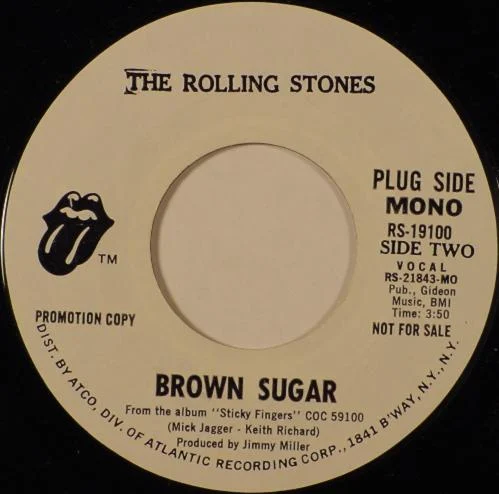In Defense of Brown Sugar
A Celebration of The Rolling Stones' Most Endangered Song
Mick Jagger is the great unsung genius of rock music, the most accomplished songwriter in rock history never to be hailed as an accomplished singer-songwriter. Sure, Sir Mick's showmanship, his longevity, his business acumen, and the sheer fact of his survival have all been both noted and noticed (how could you not?) but what about the songwriting?
I thought about this after finding a white-label promo copy of “Brown Sugar” in a box of old seven-inch singles at Grantski’s Records in Augusta, Georgia. What first caught my attention was a perforated beige label with the number 1971 pasted on one side of the record, but what really got me was one incredible word in all caps, MONO. When I saw the price tag—forty dollars, for a cruddy taped-over seven-inch single, I bought the thing without hesitation. With an alternate mix featuring extra Mick Jagger jive talk throughout the record, and completely different studio chatter as end punctuation, this little record is a must-have for the committed Rolling Stones fan and student of rock history.
“Brown Sugar,” in my book the quintessential Stones song, maybe the quintessential rock song, begins in outrageous fashion with Mick Jagger declaring the unspeakable:
Gold Coast slave ship bound for cotton fields
Sold in the market down in New Orleans!
Scarred old slaver you know he’s doing alright
Hear him whip the women just around midnight!
In his autobiography, Keith Richards recounts that his bandmate took less than an hour to complete the lyrics on a green steno pad, alone in some back room of the Muscle Shoals Sound Studio in Sheffield, Alabama, one of the great eureka moments in rock. Mick also gets credit for the song’s thrilling opening riff, the Stones’ most devastating fanfare, which he wrote in Australia while working on the kangaroo western "Ned Kelly". Although in a 1995 Rolling Stone interview Sir Mick distanced himself from the song, he also recognized that he had conjured up a provocation so complete, that it managed to encompass a pile of current and former taboos—inter-racial sex and racism, misogyny, drugs and addiction, rape, sadomasochism, voyeurism (“you should have heard him just around midnight”), that is,
The whole mess thrown in. All the nasty subjects in one go. I didn’t think about it at the time. I would never write that now. I would probably censor myself. I’d think, “Oh God, I can’t. I’ve got to stop. I can’t just write raw like that.”
Later in this same interview, Jagger explained that from the beginning, what drew him to the stage was the opportunity to provoke and incite maximum excitement:
[When I was 15, 16 years old] I used to do mad things [on stage]… go on my knees and roll on the ground…. People were shocked. I could see it in their faces…. It’s a real buzz…. And my parents were extremely disapproving of it all. Because it was just not done.
I think Mick Jagger learned very early in his career that his destiny as an artist would be as a professional provocateur, which explains why his best work unflinchingly examines the hypocrisy and hollowness of modern life, from mass media (“A man comes on the radio, he’s telling me…about some useless information”), consumerism (“I’m watching my TV, a man comes on to tell me, how white my shirts can be”), toxic masculinity (“He can’t be a man because he doesn’t smoke the same cigarettes as me”), and even existential dread (“I can’t get no satisfaction”), and that’s just one song! (But what a song!)
I think the Rolling Stones’ singer rarely receives praise for his satiric gifts and literary talent because writers worry that readers will mistake praise for Mick Jagger’s considerable gifts as an endorsement of his songs’ most outrageous transgressions—heck, it took me months to write this article as the dread of being “cancelled” nearly cancelled my enthusiasm for writing about maybe rock’s least recognized literary talent.
That doesn’t mean I’m not embarrassed about my love for the Rolling Stones’ most objectionable material, their absolute nastiest stuff, especially “Brown Sugar,” but also “Stray Cat Blues” (“I can see that you’re fifteen years old, but I don’t want your ID”), “Some Girls” (“Black girls just want to get fucked all night, I just don’t have that much jam”), “Monkey Man” (“I’m a flea-bit peanut monkey, all my friends are junkies!”), and “Memo to Turner” (“Didn’t you drown a Jew in Rampton when he washed his sleeveless shirt/With a Spanish-speaking gentlemen, the one that we called Kurt?”). That last piece of cancel-worthy gold was written for the 1970 art movie Performance, in which Sir Mick delivers the song with such evil glee that it’s easy to see why his ability to give a compelling and electric performance has always overshadowed his gifts as a writer.
Watching this video of Mick Jagger in "Performance" helped me to realize that all of the nastiness in Stones’ songs is also part of the performance, which means there is little chance that Mick Jagger is a racist, a fact supported by the number of times he turned over the microphone and ceded the spotlight to men and women of color, from Merry Clayton in “Gimme Shelter” to Sonny Rollins in “Waiting on a Friend.”
If Mick Jagger is not a racist, the question remains, am I one for preferring “Brown Sugar,” “Sweet Black Angel,” and “Live With Me” over say, “Wild Horses” or “She’s a Rainbow”? I still find it hard to reconcile the fact that my favorite Stones songs are the ones with the most disturbing and offensive subject matter.
I’ve spent fifteen years of my legal career prosecuting the kind of people Mick Jagger portrays in “Stray Cat Blues” and “Some Girls.” (I was also a public defender for eight years). I admit I am fascinated, even enthralled, by the problem of evil, its external commission and internal indulgence, both in the criminal cases I prosecute and the art I most enjoy, from the fiction of Stanley Elkin (“The Bailbondsman,” “The Living End”) and Philip Roth ("Sabbath’s Theatre", "The Plot Against America") to the movies of Martin Scorsese and Quentin Tarrantino, especially "Goodfellas", "Cape Fear", "Jackie Brown", and "Django Unchained". No doubt I get a buzz from how wrong it is to love “Brown Sugar,” a thrill Mark Twain described when he said “There is a charm about the forbidden that makes it unspeakably desirable.” The most contemptible Stones’ songs are the ones which touch that part of me that wants to free all the pet-store beasts, I mean, dogs and cats, to run through the mall like wild animals. I want to drive a Mercedes, not a modern one, but one of those art-deco Nazi cars from the ‘30s, partly because it’s wrong, and partly because as a Jew, to do so would be entirely forbidden, verboten, impossible.
The appeal of forbidden fruit has even been studied by psychologists, who use the term “reactance” to describe “the motivation to regain a freedom after it has been lost or threatened.” In one famous study of reactance, a toddler began cramming cupcakes into his mouth after he was told he no longer could have them. Maybe the psychological phenomenon of reactance explains my guilty addiction to the Rolling Stones. Maybe, but I also think that when Brown University schooled me on the evils of institutional racism, homophobia, and misogyny (attitudes found in the best Stones songs), I saw how eager some of my classmates were to denounce and destroy art with these ugly attitudes. The advent of the "#MeToo" era pushed the Stones' most controversial work to the margins of acceptability, so much so that last year Mick announced that he had banished "Brown Sugar" from the set list of the band's performances. Even more than my furtive hunger for all things off limits is my need to save things, whether they are old records in a junk pile or art balancing on the precipice of oblivion, you know, like "Brown Sugar," my favorite of the whole bad batch. Although Mick Jagger, and his fellow Rolling Stones, make licentious art impervious to cancellation, I worry about the song, which has become an endangered species, like a racist Mastodon. I think "Brown Sugar" will survive, if not on the radio or the Stones set list, but at least in the grooves of my fantastic-sounding promo copy of the Stones' masterpiece.
Further listening
On November 7, 2002, at the Hideout in Chicago, members of indie rock bands Califone and Eleventh Dream Day performed an entire set of Rolling Stones songs, including “Loving Cup,” “Ventilator Blues,” “Bitch,” “Sweet Black Angel,” “Rocks Off,” “Miss You,” and “Live With Me,” finishing the set with a grungy and deranged version of “Monkey Man.” (Looking on YouTube, I only found one song from the performance, a beautiful rendition of “No Expectations”) Titled “Knub-U-Knive,” and only sold in small numbers at Califone shows, the compilation features unique hand-drawn art work. (My copy recreates in crude Sharpie the fishnet thighs from an old Velvet Underground record.) Although rare, “Knub-U-Knive” is an essential record for the committed Stones fan, as it is a bracing, bruising celebration of the Stones’ songs most deserving and defiant of cancellation.







































.png)








